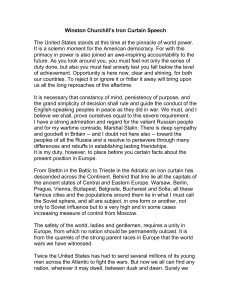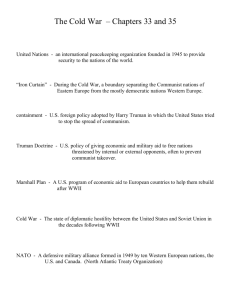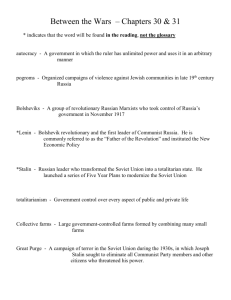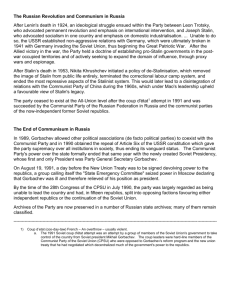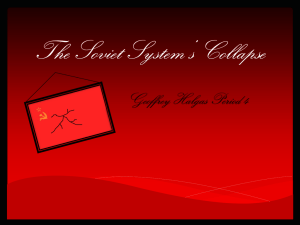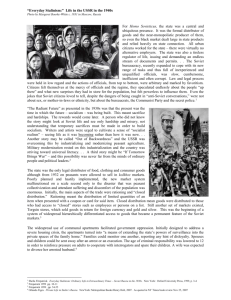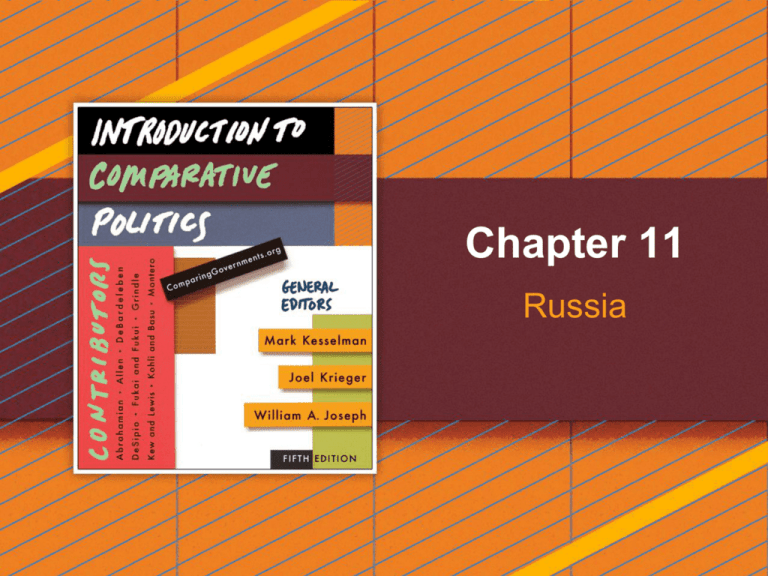
Chapter 11
Russia
Key Terms (1 of 13)
• Patrimonial state: A system of governance in
which a single ruler treats the state as personal
property (patrimony). Appointments to public
office are made on the basis of unswerving
loyalty to the ruler. In turn, state officials exercise
wide authority in other domains, such as the
economy, often for their personal benefit and
that of the ruler, to the detriment of the general
population.
Copyright © Cengage Learning. All rights reserved.
11 | 2
Key Terms (2 of 13)
• Democratic centralism: A system of political
organization developed by V. I. Lenin and practiced, with
modifications, by all communist party-states. Its
principles include a hierarchal party structure in which (1)
party leaders are elected on a delegate basis from lower
to higher party bodies; (2) party leaders can be recalled
by those who elected them; and (3) freedom of
discussion is permitted until a decision is taken, but strict
discipline and unity should prevail in implementing a
decision once it is made. In practice, in all Communist
parties in China, the Soviet Union, and elsewhere,
centralizing elements tended to predominate over the
democratic ones.
Copyright © Cengage Learning. All rights reserved.
11 | 3
Key Terms (3 of 13)
• Vanguard party: A political party that claims to
operate in the “true” interests of the group or
class it purports to represent, even if this
understanding doesn’t correspond to the
expressed interests of the group itself. The
Communist parties of the Soviet Union and
China are good examples of vanguard parties.
• Collectivization: A process undertaken in the
Soviet Union under Stalin in the late 1920s and
early 1930s and in China under Mao in the
1950s, by which agricultural land was removed
from private ownership and organized into large
state and collective farms.
Copyright © Cengage Learning. All rights reserved.
11 | 4
Key Terms (4 of 13)
• Tacit social contract: An idea put forth by
some Western analysts that an unwritten
informal understanding existed between the
population and the party/state in the postStalinist Soviet Union, which helped form the
basis of social and political stability; the implicit
agreement involved citizens granting political
compliance with Soviet rule in exchange for
benefits such as guaranteed employment, free
social services, a lax work environment, and
limited interference in personal life.
Copyright © Cengage Learning. All rights reserved.
11 | 5
Key Terms (5 of 13)
• Perestroika: The policy of restructuring embarked on by
Gorbachev when he became head of the Communist
Party of the Soviet Union in 1985. Initially, the policy
emphasized decentralization of economic decision
making, increased enterprise autonomy, expanded
public discussion of policy issues, and a reduction in the
international isolation of the Soviet economy. Over time,
restructuring took on a more political tone, including a
commitment to glasnost and demokratizatsiia.
• Glasnost: Gorbachev’s policy of “openness” or
“publicity,” which involved an easing of controls on the
media, arts, and public discussion, leading to an outburst
of public debate and criticism covering most aspects of
Soviet history, culture, and policy.
Copyright © Cengage Learning. All rights reserved.
11 | 6
Key Terms (6 of 13)
•
•
Demokratizatsiia: The policy of democratization identified by former
Soviet leader Mikhail Gorbachev in 1987 as an essential component
of perestroika. The policy was part of a gradual shift away from a
vanguard party approach toward an acceptance of liberal
democratic norms. Initially, the policy embraced multicandidate
elections and a broadening of political competition within the
Communist Party itself; after 1989, it involved acceptance of a
multiparty system.
Law-based state: A state where the rule of law prevails, so that
actions of the government as well of nongovernmental actors are
subject to the requirements of the law. The creation of a law-based
state in the Soviet Union was one of the explicit goals of
Gorbachev’s reform process, thus limiting the ability of state
agencies or the Communist Party of the Soviet Union to arbitrarily
circumvent laws or legal provisions.
Copyright © Cengage Learning. All rights reserved.
11 | 7
Key Terms (7 of 13)
• Market reform: A strategy of economic transformation
embraced by the Yeltsin government in Russia and the
Deng Xiaoping government in China that involves
reducing the role of the state in managing the economy
and increasing the role of market forces. In Russia,
market reform is part of the transition to postcommunism
and includes the extensive transfer of the ownership of
economic assets from the state to private hands.
• Shock therapy: A variant of market reform that involves
the state simultaneously imposing a wide range of
radical economic changes, with the purpose of
“shocking” the economy into a new mode of operation.
Shock therapy can be contrasted with a more gradual
approach to market reform.
Copyright © Cengage Learning. All rights reserved.
11 | 8
Key Terms (8 of 13)
• Joint-stock company: A business firm whose capital is
divided into shares that can be held by individuals,
groups of individuals, or governmental units. In Russia,
formation of joint-stock companies has been the primary
method for privatizing large state enterprises.
• Privatization voucher: A certificate worth 10,000 rubles
issued by the government to each Russian citizen in
1992 to be used to purchase shares in state enterprises
undergoing the process of privatization. Vouchers could
also be sold for cash or disposed of through newly
created investment funds.
Copyright © Cengage Learning. All rights reserved.
11 | 9
Key Terms (9 of 13)
•
•
•
Insider privatization: A term used in relation to Russia to refer to
the transformation of formerly state-owned enterprises into jointstock companies or private enterprises in which majority control of
the enterprise is in the hands of employees and/or managers of that
enterprise.
Oligarchs: A small group of powerful and wealthy individuals who
gained ownership and control of important sectors of Russia’s
economy in the context of the privatization of state assets in the
1990s.
Mafia: A term borrowed from Italy and widely used in Russia to
describe networks of organized criminal activity that pervade both
economic and governmental securities in that country and activities
such as the demanding of protection money, bribe taking by
government officials, contract killing, and extortion.
Copyright © Cengage Learning. All rights reserved.
11 | 10
Key Terms (10 of 13)
•
•
•
“State capture”: The ability of firms to systematically turn state
regulations to their advantage through payoffs to officials.
Nomenklatura: A system of personnel selection under which the
Communist Party maintained control over the appointment of
important officials in all spheres of social, economic, and political
life. The term is also used to describe individuals chosen through
this system and thus refers more broadly to the privileged circles in
the Soviet Union and China.
Path dependence: A concept used initially by economists and now
by political scientists to analyze the manner in which previous
institutional structures and conditions constrain and influence
opportunities for change; path dependence does not, however,
imply determinism, since contingent events and human agency can,
within limits, also influence outcomes.
Copyright © Cengage Learning. All rights reserved.
11 | 11
Key Terms (11 of 13)
•
•
Patron-client networks: An informal aspect of policymaking in
which a powerful patron (for example, a traditional local boss,
government agency, or dominant party) offers resources such as
land, contracts, protection, or jobs in return for the support and
service (such as labor or votes) of lower-status and less powerful
clients: corruption, preferential treatment, and inequality are
characteristic of clientelist politics.
Siloviki: Derived from the Russian word “sil,” meaning “force.”
Russian politicians and government officials drawn from security
and intelligence agencies (such as the Soviet KGB or its
contemporary counterpart, the FSB), special forces, or the military,
many of whom were recruited to important political posts under
Vladimir Putin.
Copyright © Cengage Learning. All rights reserved.
11 | 12
Key Terms (12 of 13)
• Asymmetrical federalism: A system of governance in
which political authority is shared between a central
government and regional or state governments, but
where some subnational units in the federal system have
greater or lesser powers than others.
• Power vertical: A term used by Vladimir Putin to
describe a unified and hierarchical structure of executive
power ranging from the federal level to the local level,
which can be reinforced by various mechanisms such as
appointments by higher level officials and oversight of
activities by higher organs over lower ones.
Copyright © Cengage Learning. All rights reserved.
11 | 13
Key Terms (13 of 13)
• Civil society: Refers to the space occupied by voluntary
associations outside the state, for example, professional
associations (lawyers, doctors, teachers), trade unions,
student and women’s groups, religious bodies, and other
voluntary association groups. The term is similar to
society, although civil society implies a degree of
organization absent from the more inclusive term
society.
• Proportional representation (PR): A system of political
representation in which seats are allocated to parties
within multimember constituencies, roughly in proportion
to the votes each party receives. PR usually encourages
the election to parliament of more political parties than
single-member-district winner-take-all systems.
Copyright © Cengage Learning. All rights reserved.
11 | 14

